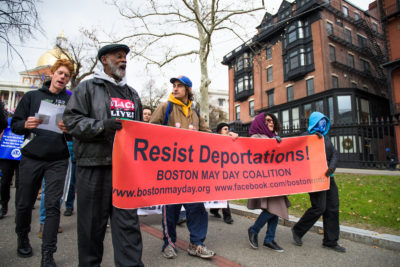
“Say it loud, say it clear, immigrants are welcome here,” chanted around 100 protesters at the Boston Common and Downtown Crossing Saturday afternoon as they rallied against the termination of the Temporary Protected Status for Haitian refugees.
Acting Secretary of Homeland Security Elaine Duke announced on Nov. 20 the discontinuation of TPS for Haitians. TPS is granted by Duke to members of a country unable to return due to extremely unsafe conditions, such as ongoing armed conflict, environmental disasters or other extraordinary and temporary dangers. The refugees have now been given 18 months to return to Haiti.
The Boston May Day Coalition, a coalition of organizations working together to support immigrant rights and perform inclusive demonstrations, hosted the rally and marched from the Massachusetts State House to the John F. Kennedy Federal Building. Matthew Andrews, co-chair of the Boston May Day Coalition, said the group has been planning the rally since the recent termination of TPS for Nicaragua in early November.
“TPS is something that tens of thousands of people rely on,” Andrews said. “To end TPS means to break up families, to disrupt people’s lives, disrupt their ability to work and there’s no indication that they would be able to pick up in their previous country. It’s based on a misguided belief that somehow the people working hardest at the bottom of our social and economic system are the cause of economic problems.”
Andrews said Boston is heavily affected by the current and ongoing termination of TPS for refugees because of its high refugee population.
Patrick Jerome, the founder of the Boston International Film Festival, spoke on his experience as a Haitian immigrant during the rally. He said he lived in hiding in Haiti for a year and a half before being granted political asylum in 1993, working as a caseworker for Haitian refugees and with the Red Cross for disaster victims after he arrived.
“I know how painful it is when you can’t see the future and see how you’re going to live with your family and prosper in this world,” Jerome said. “[Haiti is] not safe for them to go back and it’s not going to be like this for decades, so we have to fight to understand the rights those people have to live in this country and remain here because they need your help.”
Jerome said he thinks it is a moral obligation for immigrants to band together to fight for their rights.
Robert Traynham, 80, a Boston school bus driver and a member of United Steelworkers Local 8751 — Boston School Bus Drivers, said fighting against actions like the withdrawal of TPS isn’t new to him, as he fought alongside Martin Luther King Jr. and the Black Panthers. He said his union is mostly comprised of Haitians, so fighting against this is important to him.
“This is what we got to do — we can’t let this s**t go down like this,” Traynham said. “We got to bring more people out together. Like we say in the union movement, an injury to one is an injury to all, so come on, let’s fight.”
Several attendees said fighting against the injustice of taking away TPS is vital.
Keely Mullen, 23, of Jamaica Plain, and a member of the Socialist Alternative, passed out flyers at the rally explaining the connection between the attacks on the immigrant community regarding the termination of TPS and the attacks on women and communities of color. She said a lot of issues going on in the country right now are interconnected.
“We’re standing out here against these attacks, but also talking about how it’s connected to the broader movement against Trump with these new allegations around sexual assault,” Mullen said.
Quinn Angelou-Lysaker, a Boston University freshman and fellow Socialist Alternative member, said the #MeToo movement has helped their overall cause of socialist resistance, which includes immigrant rights.
“There’s an ongoing discussion about abuse of power in general as a broader concept and the #MeToo movement has really drawn people’s attention and their consciousness to other ways people in power, particularly the one percent, might be abusing their position,” Angelou-Lysaker said. “It’s a good opportunity for us to draw a connection to the broader fight.”
Sarah Koolsbergen, 58, of Belmont, said she traveled to Boston to show her support for the immigrant community because she said the United States is a nation of immigrants.
“Everyone in this country, unless you were brought here as a slave or you’re Native American already here, has come from somewhere else at some point in their lives,” Koolsbergen said. “We’re a nation of many people from all over the world who come here either against their will or had to flee oppression or political persecution or wars or famine and disasters and it can happen to anybody.”
Ana Christilles, 21, a Brandeis University senior, said immigrant rights are personal to her because her grandparents on her mother’s side immigrated from Mexico.
“I know my presence here isn’t a direct action influencing policy, but it’s still putting my voice with other people’s voices in support and solidarity,” Christilles said.





















































































































